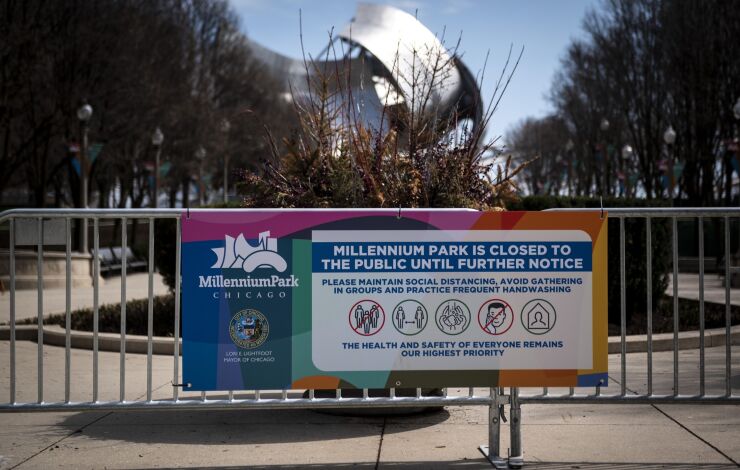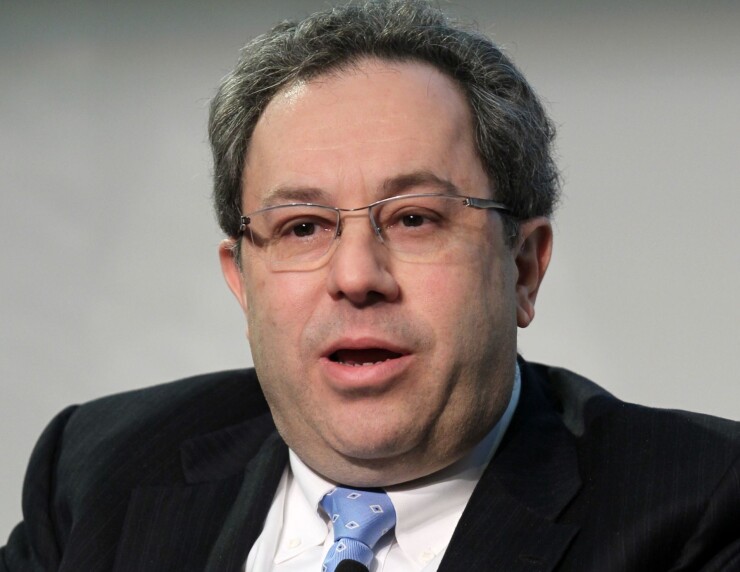Rating agencies and investors increasingly expect Illinois will push some of its worsening fiscal pain off to cities, schools, and transportation agencies as the state government grapples with plunging revenues caused by the COVID-19 pandemic.
The contagion effect could come in multiple forms.
It could lower the state funding percentage for income tax sharing and education and transit aid, some of which will also see a dwindling of available funds.

The impact could damage ratings and raise borrowing costs for local governments and agencies, widening the market-imposed penalty on Illinois-based borrowers.
Illinois Gov. J.B. Pritzker last week released revised revenue estimates that project a $2.7 billion revenue hit for the state government in the fiscal year that ends June 30 and a $4.6 billion decline for the next fiscal year.
The state next year will also need to repay $1.2 billion of cash flow borrowing and $400 million in investment rollovers being used to address this year’s gap. Another $1 billion shortage results if voters in November reject Pritzker's constitutional amendment to shift the state to a progressive income tax rate system.
Pritzker is not ready to show his hand on ideas for resolving the fiscal 2021 deficit.
Asked Tuesday how the state would close the budget gap and whether he was considering borrowing or layoffs, Pritzker said everything is on the table. "Some of that I hope will get answered by the federal government. ... That will have a big impact on our decision-making with regard to our budget," Pritzker said, adding he is in discussion with lawmakers. "This is an all hands on deck challenge ... we are looking at everything."
Pritzker has previously said he is pressing the state congressional delegation for federal relief such as
If and when federal aid arrives it won’t fully address the state’s fiscal ills, especially if a prolonged or deep recession also damages the already frail pension system, market participants said.
“We never had a revenue problem. We have now accomplished the trifecta of disaster: bad planning, negligent budgeting and now less revenue,” said Brian Battle, director of trading at Chicago-based Performance Trust Capital Partners. “Our ability to generate revenue has always masked our deficiencies. We’ve lost the mask.”

That means pain for local governments.
“The superior level of government is the state and when the state runs short of revenue it will starve its constituents with less money,” Battle said.
Battle said the state’s legal and contractual risk of default is minimal given sturdy general obligation statutes that prefund debt service, prioritize debt payments, and allow for non-general funds to cover debt service but the political risk is heightened as the state faces a greater demand for social services. “You can’t measure political risk,” Battle said.
COVID-19 has brought Illinois a downgrade and outlook cuts that leave the state government at the BBB-minus/negative level across the board.
Spreads on state paper skyrocketed, and that will be felt by local governments. “The penalty is a function of how bad things are in Illinois and where the market’s credit spreads are generally,” Battle said. “We will discover where that penalty is once the market stabilizes.”
That Illinois penalty has been limited to 10 to 30 basis points for higher rated local credits during stable periods and more than doubled when Illinois’ investment grade ratings were last threatened in 2017 amid a state budget impasse. Illinois’ spreads have remained for the last week at peak levels with the 10-year at a 381 basis point spread to the Municipal Market Data’s AAA benchmark.
Battle said in addition to more flexible federal relief, the federal government could also expand its pending lending facility for states to include smaller governmental borrowers.
State contagion will be felt by local governments because “you go down the waterfall,” said Richard Ciccarone, president of Merritt Research Services.
"Everything is on the table when you have a situation as serious as this and we don’t know what lurks around the corner. The situation is so unique it's going to require that the state use tools from all of its cabinets to put together a fix,” Ciccarone said.
The market will look at worst case scenarios for the state and its local governments, he said, and default is not off the table when considering that they will prioritize the health, safety of welfare of citizens before bondholders. “I wouldn’t take for granted any of our conventional assumptions,” Ciccarone said.

Ripple effect
Local governments were already grappling with rising pension funding demands that have driven up local taxes and hurt ratings.
The coronavirus spillover has already appeared in several recent rating actions.
S&P Global Ratings on Friday revised the Chicago Board of Education’s outlook on its junk level rating of BB to stable from positive. It was one of the tax-secured ratings impacted by the rating agency’s sectorwide shift to stable from positive.
S&P warned of CPS' vulnerable budget position.
“Given that state leaders are now projecting stark revenue declines for the last quarter of fiscal 2020 and all of fiscal 2021, maintaining existing levels of state aid will become more difficult, in our view,” S&P wrote.
The Chicago Board of Education last month approved $75 million to pay for the cost of shifting to remote learning as schools. CPS expects to receive $205 million from the CARES Act and has said it should cover anticipated near-term costs. The district has $8 billion of debt.
Moody’s Investors Service last week revised the A1-rated Illinois State Toll Highway Authority’s outlook to negative from stable. The authority has $6 billion of debt.
While toll revenue has dwindled amid the stay-at-home order that began last month, Moody’s also cited a driving factor for the outlook change as being “the relationship between the state and ISTHA” and “the authority's potential exposure to further deterioration in the state's credit and the powers a state could invoke in times of fiscal stress. These powers include actions that could impact financial matters at separately managed agencies.”
Existing statutes protect the authority’s revenues and limit them for tollway purposes. A constitutional amendment approved in 2016 also lockboxes transportation revenue for transportation purposes. Moody’s calculates the agency could withstand a 56% reduction in operating revenues this year and still maintain its ability pay debt service.
S&P Global Ratings earlier this month shifted its outlook to negative from stable on the state’s public universities citing concerns that state aid will be cut. “In our opinion, for the rated public universities, the impact from weaker economic conditions could mean a material reduction in state funding and appropriations for higher education,” S&P wrote.
For local municipalities, the state could move to further chip away at the portion of income taxes it shares through the Local Government Distributive Fund. The state has shortchanged local governments in the past with as much as a 10% cut and imposed a collection fee on sales taxes that go to transit agencies and local governments.
Pritzker has already warned of cuts should voters reject the progressive income tax amendment. If it fails, the governor’s original $42 billion general fund proposal would fall $1.4 billion short. To make up that shortage, he had proposed a half-year, 5% cut in the LGDF of $73 million. The scheduled $350 million increase in kindergarten through 12th grade evidence-based funding would shrink to $200 million and a higher education increase would shrink.
Illinois’ pinched financial state was underscored in a letter sent by Senate President Don Harmon, D-Oak Park, to U.S. Sen. Dick Durbin, D-Illinois, seeking $40 billion in relief. That included $15 billion to cover the state’s revenue shortfall, $10 billion to support a pension system just 40% funded with a $137 billion unfunded tab and a $54 billion retiree healthcare liability, $6 billion for its unemployment trust fund, and $9.6 billion for local governments.
Ciccarone called Harmon’s request a misfire and worries that it could backfire as the state tries to make its case for more flexible aid to help deal with the revenue losses.
“Everyone knows Illinois had the problem before the crisis started" where pension and a lack of reserves are concerned, Ciccarone said.
Pritzker distanced himself from the request when asked about it over the weekend, saying there was no reason for the Senate president not to communicate directly with the congressional delegation but he had not been aware of the letter’s content. “It’s different than what I have been talking to the federal representatives about,” Pritzker said.
The crisis does offer an opportunity for Pritzker to put back on the table options he’s shot down, like working with unions to achieve pension savings. The Illinois Supreme Court has banned outright pension benefit cuts as unconstitutional but left the door open for a bargained for exchange that could save the state revenue. “Everyone has to sacrifice,” Ciccarone said.





